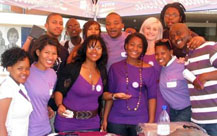 |
Kovsie students during one of their purple cake sales
30 August 2012 |
South Africa’s first student-driven CANSA (Cancer Association of South Africa) Relay for Live, organised by students from the University of the Free State, has received an International Award from the American Cancer Society.
Showing solidarity with survivors of cancer, those who have battled and lost loved ones to the disease, the Kovsie students were rewarded with the society’s 2011/2012 Heart of Relay Award for youth involvement. The award was handed out at a ceremony in Mossel Bay in the Western Cape.
The Relay for Life is a global initiative that has been running for 26 years. It is an overnight relay event where teams of people camp out around a track. Members of each team take turns walking and running around the track. They also participate in a Luminaria ceremony where loved ones lost to cancer are remembered.
Relay for Life events are held for the general public as well as tertiary institutions. The Relay for Life event, held on the Bloemfontein Campus at the beginning of the year, was the first student organised one in South Africa.
Leading up to the event, Kovsie students engaged in a number of cancer awareness campaigns. These included purple cake sales and a shava-thon event. All money raised was donated to the Cancer Association of South Africa.
Sibusiso Tshabalala, founding chairperson of the Kovsie initiative, says the students worked with the local chapter of the Childhood Cancer Foundation (CHOC). “The event was generally learning about cancer, sharing the idea of solidarity and bringing students together.” Sibusiso says a similar project is planned for next year.